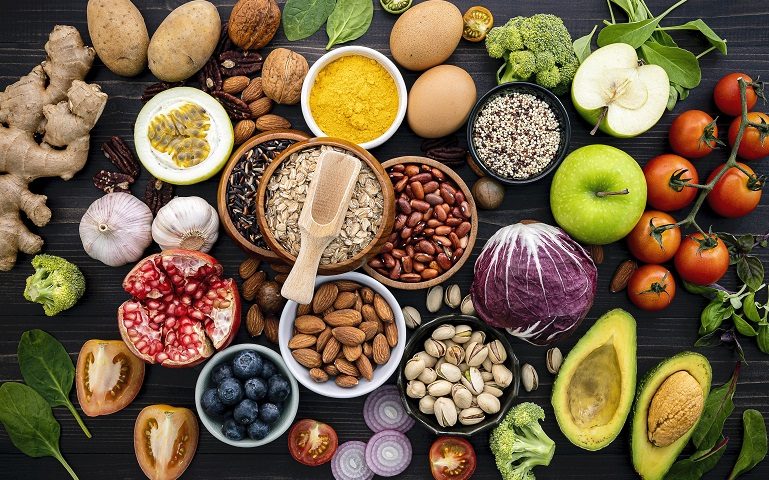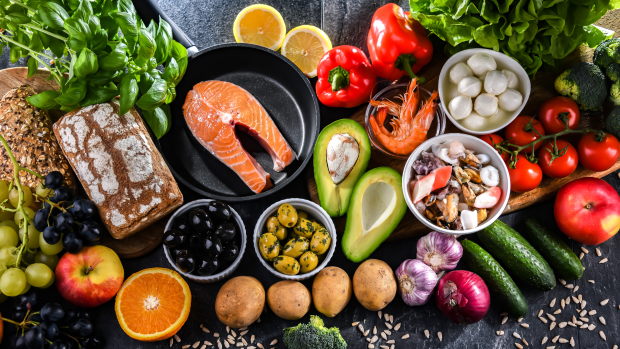Good nutrition is vital for a healthy life, but it is even more important for people living with Parkinson’s.
While there is no one Parkinson’s-specific diet plan, it is important to eat a mix of whole grains, vegetables, fruits, milk and dairy products – as well as protein-rich foods such as meat and beans.
Nuts, olive oil, fish and eggs will also add beneficial fats to your diet.
Unplanned weight loss is a particular challenge for people living with Parkinson’s and it can have a variety of causes including:
- Gradual loss of the sense of smell and taste, making eating less enjoyable.
- Some medications cause nausea, which suppresses appetite.
- Motor symptoms like tremor, slowness and stiffness and complications of treatment such as dyskinesia can make eating difficult.
- Swallowing difficulties can interfere with eating.
- People who experience depression or apathy may lose their appetite.
- Some people may be embarrassed by their slow eating, so they stop eating before they have had enough.
- People taking levodopa may have been advised to avoid taking medications with protein, making it difficult to get adequate nutrition throughout the day.
These issues need to be addressed because it is important to maintain energy with a regular food supply for cell nourishment.
After you eat, your blood glucose level will rise and beta cells in your pancreas will release insulin into your bloodstream. Insulin is like a key; it unlocks muscle, fat, and liver cells so glucose can get inside them.
Most of the cells in your body use glucose along with amino acids (the building blocks of protein) and fats for energy. However, it is also the main source of fuel for your brain – a critical consideration for people living with Parkinson’s.
After your body has used the energy it needs, the leftover glucose is stored as glycogen in the liver and muscles. Your body can only store enough to fuel for about a day, so regular meals are important.
Other tips for eating with Parkinson’s
- Eat smaller portions/meals more frequently
- Serve bite size portions for easier management
- Sit upright with good posture
- Place only a small amount of food on your eating utensils for each bite
- Concentrate on the task of eating
- Modify the foods and fluids if necessary, to ensure ingestion if you have swallowing issues
- Reheat food if it gets cold due to slowness of eating
- Use an insulated dish with small servings to ensure that your meal remains warm and palatable
- Use assistive utensils if necessary
Also be aware that Levodopa and protein are in competition to get into the blood stream – so it’s best to take this medication at least 30 minutes prior to a meal.
Fluid and fibre intake are also important for people living with Parkinson’s. The combination of water and fibre keeps your bowel moving.
Try filling a jug with 1.5 to 2 litres of water each morning, and make sure you drink that volume throughout the day to ensure adequate fluid intake.
Ingesting an adequate amount of fluids each day also helps to prevent urinary tract infections. However, be careful with beverages like tea and coffee. They have a diuretic effect and that can diminish the volume of fluids you retain.
Finally, don’t forget the benefits of sunlight and exercise combined with good nutrition.
Regular sun exposure is the natural way to get enough vitamin D. To maintain healthy blood levels, aim to get up to 30 minutes of sunlight, several times per week.
In addition to being second only to medication in slowing the progression of Parkinson’s symptoms, exercise aids in maintaining bone density – which is particularly important as you age.
Do you have questions about nutrition and exercise while living with Parkinson’s?
Call the Parkinson’s NSW HealthLine for evidence-based information: 1800 727 567






